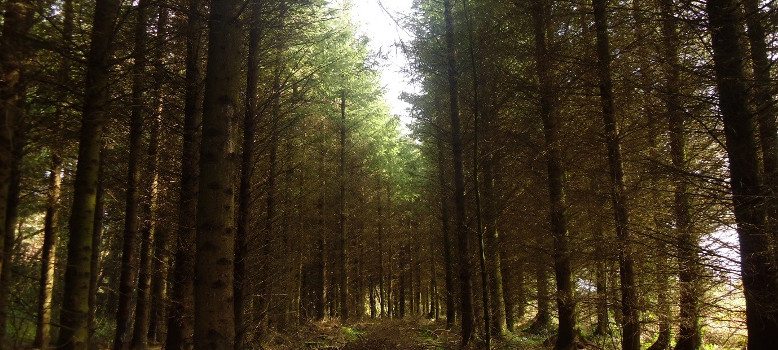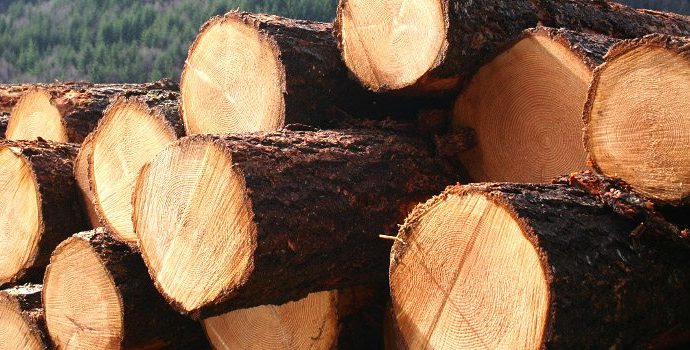Forestry Council Report March 2023

- Market Review
- IFA published a Timber Market Report for October – December 2022 (enclosed). The report shows a continued downward trend in timber prices.
- Prices for sawlog saw the largest decrease with prices in October to December ranging from €80 to €90/tonne, down 28% compared to prices quoted in January 2022.
Timber prices are expected to see some improvements in 2023 with reports of increased prices received in January 2023.
Figure 1. Average Roadside Timber Price (October 2022 – December 2022)
- The Department’s licence dashboard for January shows that a total of 241 licences issued in the month of January which is the equivalent to a weekly average of 60 licences.
- The breakdown is as follows: Afforestation 2 (1%), Forest Roads 8 (3%), Private Felling 104 (43%) and Coillte Felling 127 (53%).
A total of 211 felling licences issued of which private felling licences accounted for 49% (104) of the felling licences issued.
Figure 2. Forest Licence Dashboard (Week 1 February 2023)
- Afforestation licences to plant 47 hectares were issued in January, with 66 hectares planted as of the end of January 2023.
- Forest Roads licences to construct 3 km of new forest roads issued, with 6km of new forest roads constructed to date.

Figure 3. Review of licences issued versus planted/constructed (Week 1 February 2023).
- Activity since last National Council
- The new Forestry Programme 2023 to 2027 has not yet been submitted. The Department is in regular contact with DG Envi to respond to concerns in relation to the new programme. No new afforestation and forest road applications can be processed until application has been submitted and State Aid approval received. Under the new Forestry Programme:
- Support for forest road construction will increase to €55 per linear metre (at a density of 25 metres per ha of forest) and to €10,000 for special construction works.
- No premium payments are proposed for the Reconstitution and Underplanting Scheme (RUS). The requirement for planning permission for ash plantations under 10 ha replanted with conifer will be removed.
- All afforestation projects can avail of the Environmental Report Grant to help offset additional regulatory requirements in the application process. The grant is €450 per ha, for the first ha, €400 for the second ha, €350 for the third ha and €50 per ha for subsequent ha to a maximum of 20 ha.
- IFA met with DAFM to discuss the Interim Afforestation and Forest Road Schemes (via General De Minimis). The interim arrangements allow farmers with valid afforestation and/or road licence to plant new forest or construct road under General De Minimis aid for farmers. IFA developed a briefing note (enclosed) on the Interim Afforestation and Forest Road Schemes (via General De Minimis).
- IFA met with Minister Hackett and Barry Delaney, Director of Forestry to discuss the Forestry Programme 2023 to 2027, draft Forest Strategy and the inadequate supports for farmers will ash dieback.
- IFA presented to the Joint Oireachtas on Agriculture, Food, and the Marine to discuss Forestry Policy and Strategy on Wednesday 22nd February. In the opening statement (enclosed) the following points were raised:
- The focus of future forest policy must be to prioritise farm forestry to meet afforestation targets and steps must be taken to ensure that private investors in forestry do not disrupt an already heated land market.
- The current licencing system is not fit for purpose and places too high a regulatory and cost burden on farmers. A regulatory burden that reflects the size, the type of operation, and guarantees a decision within an agreed timeframe is needed.
- The replanting obligation must be reviewed, and options proposed.
- The non-productive areas of forests have increased to 35% with no payment beyond the 20-year premium, this needs to be addressed. An ecosystem services payment must be paid for engaging in good biodiversity management practices within these areas.
- The proposed pilot Payment for Ecosystem Services scheme under the new programme is asking farmers to further reduce productive area for a seven-year payment. The payment must be for engaging in good biodiversity management practices within these areas, not further extending these areas.
- A voluntary carbon scheme must be introduced to pay farmers for the carbon sequestered.
- IFA is seeking that all plantations affected by ash dieback should be eligible for a 100% reconstitution grant and be paid a forest premium for 20 years on the replanted land to compensate for the financial loss incurred and restore confidence to these farmers.
- IFA is seeking the introduction of a financial support package which would enable farmers and landowners to safely manage infected roadside ash trees. Safely removing these trees needs to be coordinated at a local level with the Local Authorities.
- IFA met with Imelda Hurley, CEO and Mark Carlin, MD, Coillte to discuss the Irish Strategic Forestry Fund. At the meeting Coillte outlined that there was an expectation from the Government that Coillte would play role in meeting the national afforestation targets.
- The overall national strategy is to plant 450,000 hectares by 2050 to meet the 18% forest cover target, of which Coillte plan to support the planting of 100,000 hectares, which is the equivalent to 22% of the overall afforestation programme.
- The 1st phase of the plan will be delivered over the next 5 years and is comprised of three elements: (i) identify suitable public lands (Local Authority, Bord na Mona lands), (ii) Native Trust, a not-for-profit trust that will establish native woodland in partnership with companies and (iii) Irish Strategic Forestry Fund, which aims to purchase 12,000 hectares of which 3,000 to 3,500 will be new planting.
- At the meeting Coillte confirmed that no other plans with private equity funds beyond Irish Strategic Forestry Fund. IFA asked Coillte to reflect on the achievability of the afforestation targets and look at other vehicles on how this target could be achieved outside of investor funds.
- IFA met with Joe O’Carroll, Investment Director, Gresham House to clarify details in relation to Irish Strategic Forestry Fund.
- IFA issued a press release to highlight the potential of the Irish Strategic Forestry Fund to distort the land market and a joint statement with other forestry organisations.
- IFA developed a lobbying note (enclosed) on the Coillte Afforestation plan.
- IFA attended a Project Woodland WG 1 meeting to develop systems to reduce forest licence backlog.
- IFA made submission to the Public Consultation on the Management of Deer in Ireland with regards to the concerns of private forest owners.
- IFA wrote to Minister Eamon Ryan to seek a meeting to discuss the potential introduction of a financial support package for farmers and landowners to manage ash trees that have been infected by ash dieback in hedgerows along public roads. The health and safety concerns to public road users was highlighted.
- IFA provided feedback to the Forestry Grant and Premium Schemes section in the Farmers Charter particularly around the application process and inspections.
- The IFA Farm Forestry committee met online on the 16th and 17th January and in person on the 30th of January.
- Any EU/COPA developments
Geraldine O’Sullivan, Senior Policy Executive will meet with DG Environment on the Forestry Programme next Tuesday, 28th February in Brussels.
- Upcoming issues
- IFA is to organise a national event on forestry, topics to include: ash dieback, forest carbon and the new forestry programme etc.


